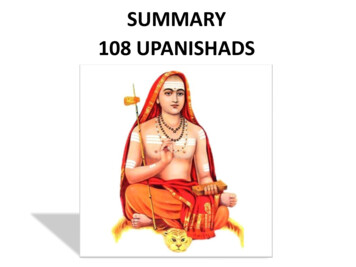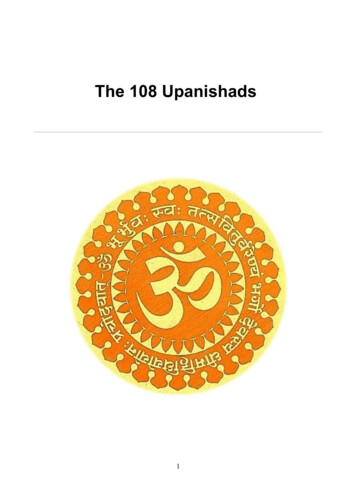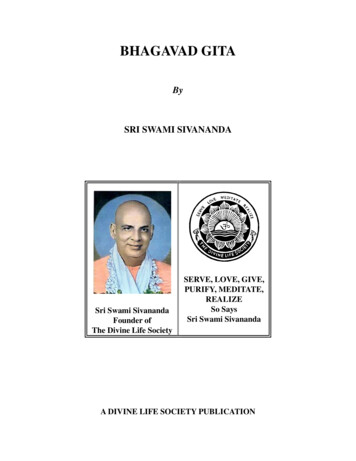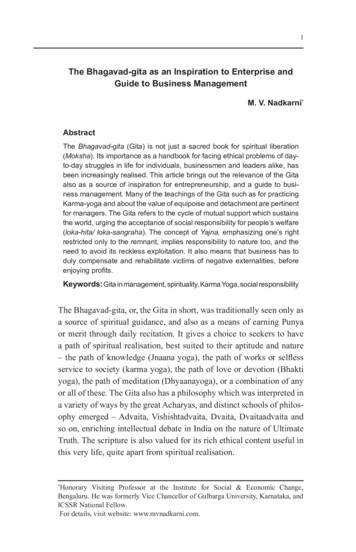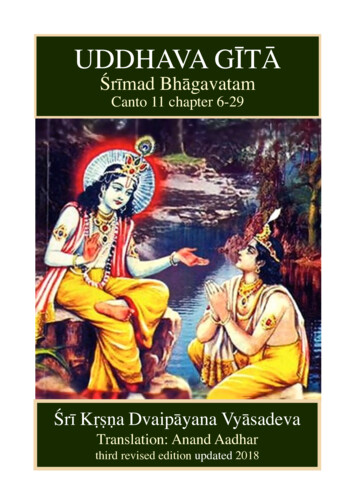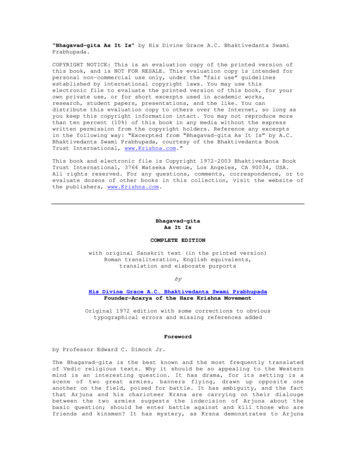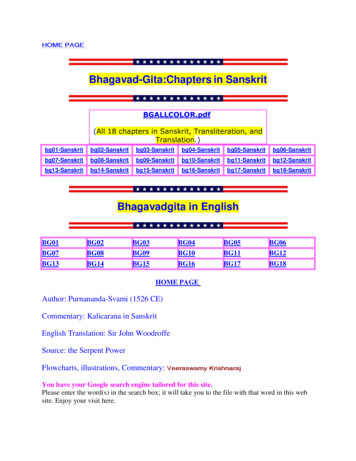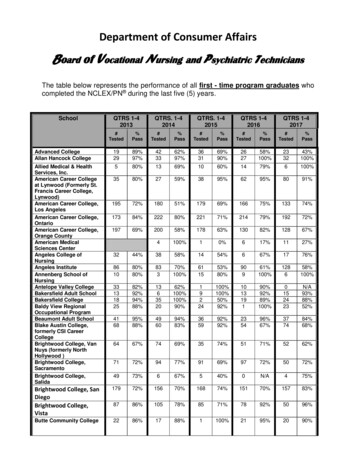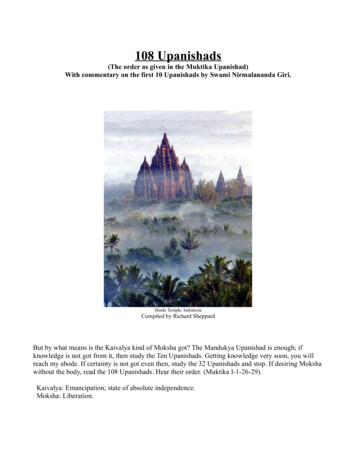
Transcription
108 Upanishads(The order as given in the Muktika Upanishad)With commentary on the first 10 Upanishads by Swami Nirmalananda Giri.Hindu Temple, IndonesiaCompiled by Richard SheppardBut by what means is the Kaivalya kind of Moksha got? The Mandukya Upanishad is enough; ifknowledge is not got from it, then study the Ten Upanishads. Getting knowledge very soon, you willreach my abode. If certainty is not got even then, study the 32 Upanishads and stop. If desiring Mokshawithout the body, read the 108 Upanishads. Hear their order. (Muktika I-1-26-29).Kaivalya: Emancipation; state of absolute independence.Moksha: Liberation.
108 Upanishads1. Isa*2. Kena*3. Katha*4. Prasna*5. Munda*6. Mandukya*7. Taittiri*8. Aitareya*9. Chandogya*10. Brihadaranyaka*11. Brahma12. Kaivalya13. Jabala14. Svetasva15. Hamsa16. Aruni17. Garbha18. Narayana19. Paramahamsa20. Amritabindu21. Amritanada22. Atahrvasirah23. Atharvasikha24. Maitrayini25. Kaushitakibrahmana26. Brihajjabala27. Nrisimhatapini28. Kalagnirudra29. Maitreya30. Subala31. Kshurika32. Mantrika33. Sarvasara34. Niralamba35. Sukarahasya36. Vajrasuchika37. Tejobindu38. Nadabindu39. Dhyanabindu40. Brahmavidya41. Yogatattva42. Atmabodha43. Naradaparivrajaka44. Trisikhi45. Sita46. Yogachudamani47. Nirvana48. Mandalabrahmana49. Dakshinamurti50. Sarabha51. Skanda52. Tripadvibhuti-Mahanarayana53. Advayataraka54. Ramarahasya55. Ramatapani56. Vasudeva57. Mudgala58. Sandilya59. Paingala60. Bhiksu61. Mahat62. Sariraka63. Yogasikha64. Turiyatita65. Sannyasa66. Paramahamsaparivrajaka67. Akshamalika68. Avyakta69. Ekakshara70. Annapurna71. Surya72. Akshi* Followed by Commentary by Swami Nirmalananda Giri.73. Adhyatma74. Kundika75. Savitri76. Atma77. Pasupata78. Parabrahma79. Avadhutaka80. Tripuratapini81. Devi82. Tripura83. Katharudra84. Bhavana85. Rudrahridaya86. Yoga-kundali87. Bhasma88. Rudraksha89. Ganapati90. Darsana91. Tarasara92. Mahavakya93. Panchabrahma94. Pranagnihotra95. Gopalatapini96. Krishna97. Yajnavalkya98. Varaha99. Satyayani100. Hayagriva101. Dattatreya102. Garuda103. Kalisamtarana104. Jabali105. Saubhagyalakshmi106. Sarasvatirahasya107. Bahvricha108. Muktika
Isavasya UpanishadTranslated by Vidyavachaspati V. PanoliOm ! That is full; this is full, (for) from the full the full (indeed) arises.When the full is taken from the full, what remains is full indeed.Om! Peace! Peace! Peace!1. Om. All this should be covered by the Lord, whatsoever moves on the earth. By such a renunciationprotect (thyself). Covet not the wealth of others.2. By performing karma in this world (as enjoined by the scriptures) should one yearn to live a hundredyears. Thus action does not bind thee, the doer. There is no other way than this.3. Those worlds of Asuras (demons) are enshrouded by blinding gloom. Those who are the slayers ofthe Self go to them after death.4. Unmoving, It is one, faster than the mind. The senses cannot reach It, for It proceeds ahead.Remaining static It overtakes others that run. On account of Its presence, Matarsiva (the wind)conducts the activities of beings.5. It moves; It moves not. It is far; It is near. It is within all; It is without all.6. He who perceives all beings in the Self alone, and the Self in all beings, does not entertain any hatredon account of that perception.7. When a man realizes that all beings are but the Self, what delusion is there, what grief, to thatperceiver of oneness?8. That (Self) is all-pervading, radiant, bodiless, sore less, without sinews, pure, untainted by sin, theall-seer, the lord of the mind, transcendent and self-existent. That (Self) did allot in proper order to theeternal Prajapatis known as samvalsara (year) their duties.9. Those who worship avidya (karma born of ignorance) go to pitch darkness, but to a greater darknessthan this go those who are devoted to Vidya (knowledge of the Devatas).10. Different indeed, they say, is the result (attained) by vidya and different indeed, they say, is theresult (attained) by avidya. Thus have we heard from the wise who had explained it to us.11. He who knows both vidya and avidya together, transcends mortality through avidya and reachesimmortality through vidya.12. To pitch darkness they go who worship the Unmanifested (Prakriti). To a greater darkness than this
go those who are devoted to the Manifested (Hiranyagarbha).13. Different indeed, they say, is the result (attained) by the worship of the Manifested and differentindeed, they say, is the result (attained) by the worship of the Unmanifested. Thus have we heard fromthe wise who had explained it to us.14. He who knows both the Unmanifested and the destructible (Hiranyagarbha) together, transcendsdeath by the (worship of) the destructible and attains immortality by the (worship of ) theUnmanifested.15. The face of the Truth (ie., Purusha in the solar orb) is veiled by a bright vessel. Mayst thou unveil it,O Sun, so as to be perceived by me whose dharma is truth.16. O nourisher, pilgrim of the solitude, controller, absorber (of all rasas), offspring of Prajapati, castaway thy rays, gather them up and give up thy radiating brilliance. That form of thine, most graceful, Imay behold. He, the Purusha (in the solar orb), I am.17. Let (my) vital air (prana) now attain the immortal Air (all-pervading Self); then let this body bereduced to ashes. Om, O mind, remember – remember that which has been done, O mind, remember –remember that which has been done.18. O Fire, O Deva, knower of all our actions or all our knowledge, lead us by the good path forenjoying the fruits of actions. Liberate us from our deceitful sins. We offer thee ever more our words ofadoration.Om! That is full; this is full, (for) from the full the full (indeed) arises.When the full is taken from the full, what remains is full indeed.Om ! Peace ! Peace ! Peace !Here ends the Isavasyopanishad, as contained in the Sukla-Yajur-Veda.Isha Upanishad CommentaryCommentary on the Isavasya Upanishad–by Swami Nirmalananda GiriSeeing All Things in GodAn instructive storyJust before going to India for the first time in 1962, I had the great good fortune to meet and hear Sri A.B. Purani, the administrator of the renowned Aurobindo Ashram of Pondicherry, India. From his lips Iheard the most brilliant expositions of Vedic philosophy; nothing in my subsequent experience hasequaled them. In one talk he told the following story:In ancient India there lived a most virtuous Brahmin who was considered by all to be the best authority
on philosophy. One day the local king ordered him to appear before him. When he did so, the king said:"I have three questions that puzzle-even torment-me: Where is God? Why don't I see Him? And whatdoes he do all day? If you can't answer these three questions I will have your head cut off." TheBrahmin was appalled and terrified, because the answers to these questions were not just complex, theywere impossible to formulate. In other words: he did not know the answers. So his execution date wasset.On the morning of that day the Brahmin's teenage son appeared and asked the king if he would releasehis father if he-the son-would answer the questions. The king agreed, and the son asked that a containerof milk be brought to him. It was done. Then the boy asked that the milk be churned into butter. That,too, was done."The first two of your questions are now answered," he told the king.The king objected that he had been given no answers, so the son asked: "Where was the butter before itwas churned?""In the milk," replied the king."In what part of the milk?" asked the boy."In all of it.""Just so, agreed the boy, "and in the same way God is within all things and pervades all things.""Why don't I see Him, then," pressed the king."Because you do not 'churn' your mind and refine your perceptions through meditation. If you do that,you will see God. But not otherwise. Now let my father go.""Not at all," insisted the king. "You have not told me what God does all day.""To answer that," said the boy, "we will have to change places. You come stand here and let me sit onthe throne."The request was so audacious the king complied, and in a moment he was standing before theenthroned Brahmin boy who told him: "This is the answer. One moment you were here and I was there.Now things are reversed. God perpetually lifts up and casts down every one of us. In one life we areexalted and in another we are brought low-oftentimes in a single life this occurs, and even more thanonce. Our lives are completely in His hand, and He does with us as He wills."The Brahmin was released and his son was given many honors and gifts by the king.The Isha Upanishad opens with the answer to the question as to God's "whereabouts."He is within all"In the heart of all things, of whatever there is in the universe, dwells the Lord." Whatever weexperience, whether through the inner or outer senses, it is a covering of the Lord (Isha). Since itconceals, it necessarily blinds, confuses, or inhibits us. It is a door closed in our face. Tragically,throughout lives without number we have not known this simple fact and have as a consequencebelieved that the experienced, whether objective or subjective, is the sole reality and have dissipatedlife after life in involvement with it to our pain and destruction. A door is never the way out: the way
out is revealed when the door is moved aside-eliminated. Not knowing this, either, we have clawed,hammered, and hewn at the door-at least in those lives when we were not adulating and worshiping itor calling it "God's greatest gift to us"-to no avail. The root problem is our believing in the door'sreality, thinking that it is the beginning, middle, and end. Only when it disappears will we see the truththat lies beyond "things."We must not just get "inside" things, we must get to their heart. And how is that done? By getting intoour own heart, into the core of our own being. There everything will be found. The key to the door ismeditation.Another viewingPrabhavananda has conveyed the ultimate message of these opening words of the Isha Upanishad. Theliteral translation, however, gives us another view which we should consider: "All this--whatever existsin this changing universe--should be covered by the Lord." Rather than speaking of piercing to theheart of things, the literal meaning is that the Lord should be seen covering-that is, enveloping-allthings. This has two meanings.1) What I have just expressed, that we should experience-not just think intellectually-that God isencompassing all things, that we should not see things as independent or separate from God, but asexisting within God. And this vision should extend to us: we, too, exist only within Him.2) In our seeing of things, God should always be between us and them. First we should see God, andonly secondarily see the "things."The renowned Swami (Papa) Ramdas in his spiritual autobiography In Quest of God writes of his initialspiritual awakening in these words: "It was at this time that it slowly dawned upon his mind that Ramwas the only Reality and all else was false.All thought, all mind, all heart, all soul was concentratedon Ram, Ram covering up and absorbing everything."In the Bhagavad Gita, considered to convey the essence of the Upanishadic wisdom, bothPrabhavananda's and the literal translations are put together when Krishna tells Arjuna that the wise seeGod in all things and all things in God.He IS allIf we accept the foregoing, then we will take the next step and experience that "He alone is the reality."This can be understood more than one way. We can conclude that God alone is real and everything elseis unreal. The problem with that is our tendency to equate "unreal" with non-existent, and wronglybelief that everything is only an illusion, that it has no reality whatsoever. The great non-dualphilosopher Shankara explained the accurate view by likening our experience of things to that of a manwho sees a rope in dim light and mistakes it for a snake, his mind even supplying eyes that glitter and amouth that hisses at him. When light is brought, he sees that there is no snake, only a rope. The snakewas not real, but his impression, however mistaken, was real. The snake was not real, it was nonexistent; but the impression of the snake was real and did exist. The rope was the reality and the snakewas an illusion overlain on it. In the same way God is the reality and everything else is illusory like thesnake. But illusion does exist. Denying it gets us nowhere; we have to deal with it by seeing through it,by dispelling it. Then we will see the reality: God. After that we can progress to the understanding thateven though our interpretation may be wrong, what we perceive does have a real side to it, and that isGod Himself. Hence, all things are God in their real side. The "wrong" side is in our mind alone. Wecan say that God is the reality of the unreal, which we need to see past. And that is the whole idea of
the opening verse of the upanishad. He alone is real; He is all things.Be at peace"Wherefore, renouncing vain appearances, rejoice in him." All of our sorrows and troubles come fromour mistaking vain appearances for reality, from our looking at them with our outer eyes instead ofbeholding God with the inner eye. But we are addicted to those vain appearances-we have to admitthat. Yes, we are even addicted to all the pain and anxiety they bring us. That is foolish, but is it anymore foolish than it is to be addicted to drugs or alcohol-or to people that harm us? We are insane oncertain levels; this world is a madhouse for people of our particular lunacy. The sooner we understandthis and resolve to be cured and released, the better things will be for us. For from "things" we willmove on to God-perception.For this reason the yogis, those who seek God in meditation, should be the most cheerful and optimisticof people. If we look to God we will see only perfection and rejoice in it; if we look at ourselves,others, and the world
Isha Upanishad Commentary Commentary on the Isavasya Upanishad–by Swami Nirmalananda Giri Seeing All Things in God An instructive story Just before going to India for the first time in 1962, I had the great good fortune to meet and hear Sri A. B. Purani, the administrator of the renowned Aurobindo Ashram of Pondicherry, India. From his lips I
